A nationwide survey conducted by the Friedrich Ebert Stiftung Foundation and Greece’s National Centre for Social Research (EKKE) presented a detailed picture of one thousand young Greeks aged 14 to 29.
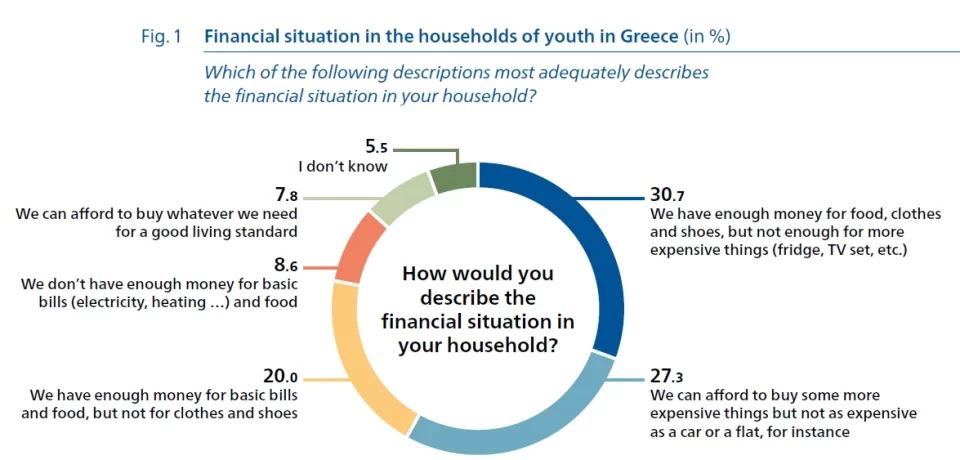
Source: Greece Youth Study 2024 (Friedrich Ebert Stiftung Foundation and EKKE)
Most young Greeks live with their parents and siblings and describe their relationships as fairly positive. Although they appreciate the traditional warmth and safety of the nuclear Greek family, young Greeks nevertheless desire their independence. However, achieving financial independence in Greece is proving difficult at a time of great uncertainty at home and abroad—only 14.2% of young Greeks live on their own.
Respondents are moderately satisfied with their lives and fairly optimistic about their personal future, but express pessimism about the future of Greece. 52% of young Greeks believe Greece is heading in the wrong direction, citing shortcomings in welfare, healthcare, unemployment, and low pensions.
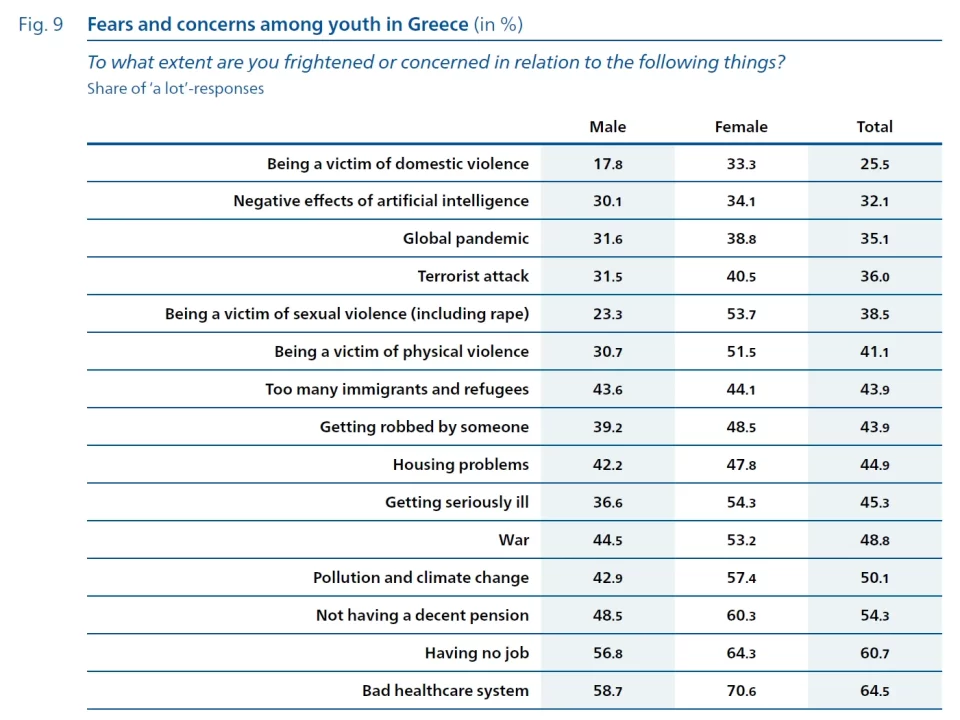
Source: Greece Youth Study 2024 (Friedrich Ebert Stiftung Foundation and EKKE)
While overt sexism is deemed a thing of the past, young men do exhibit a form of sexism that neglects women’s demands, or denies the fact that women are still discriminated against.
Young Greek women tend to be more supportive of social equality, more vocal when demanding their rights, but also feel more vulnerable to various forms of gender-based violence.
By contrast, young Greek men tend to support views that empower their position in Greek society—for instance, they feel they are better political leaders or should have priority to employment. Young Greek men are also more prone to ethnocentrism, anti-semitism, and the need to “protect” Greek culture from foreign influences.
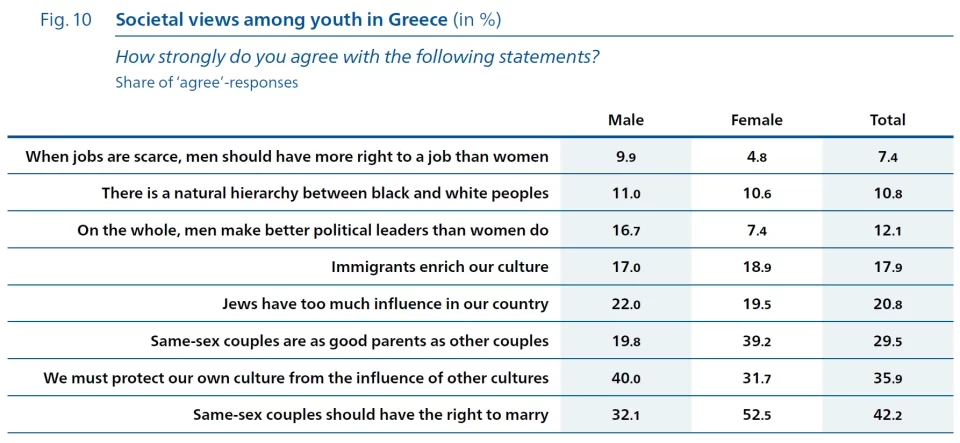
Source: Greece Youth Study 2024 (Friedrich Ebert Stiftung Foundation and EKKE)
Greek youth see themselves facing a variety of challenges in the next decade, including lack of jobs, quality of public services like health and education, corruption, immigration and climate change.
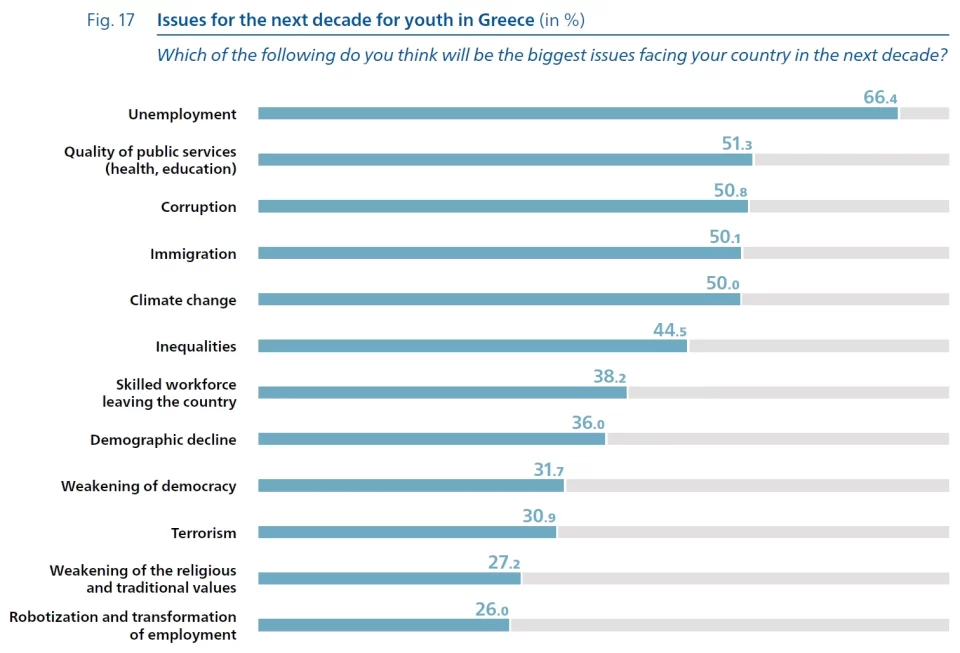
Source: Greece Youth Study 2024 (Friedrich Ebert Stiftung Foundation and EKKE)
Few of the young Greeks interview have ever lived outside Greece for more than six months, and they are generally unwilling to emigrate. But the survey findings showed that they might consider doing so for purely practical reasons, such as a higher standard of living or better wages. Nevertheless, the majority of Greek youth really hasn’t taken any steps to leave the country.
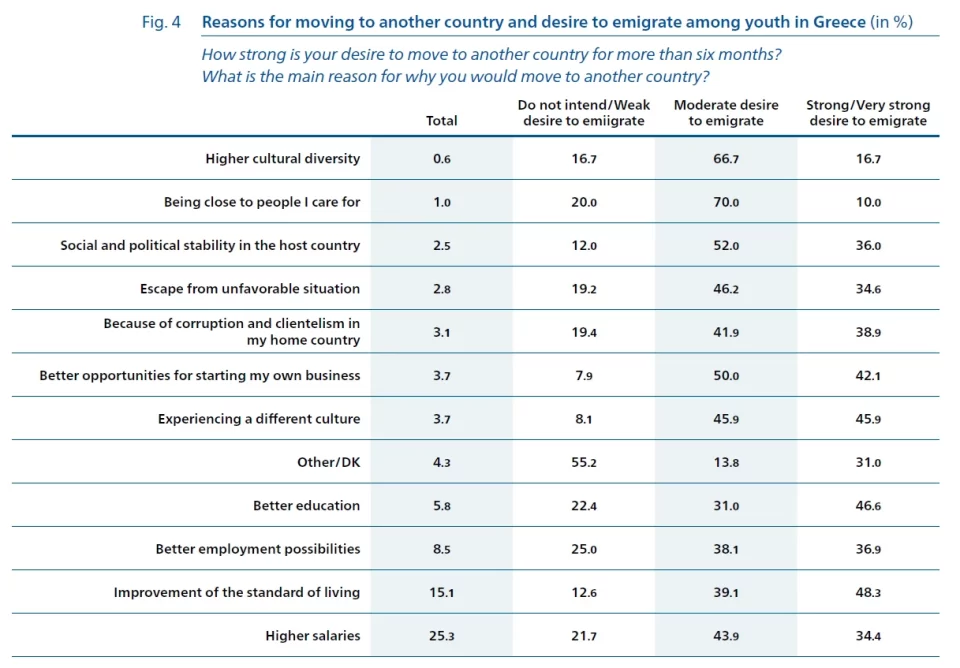
Source: Greece Youth Study 2024 (Friedrich Ebert Stiftung Foundation and EKKE)
Politically, young Greeks have a low level of interest in politics and feel under-represented. They identify as centrist and progressive, and tend to be liberal, valuing freedom over equality.
Though they take to the streets to demonstrate, and donate their time to volunteer, they don’t really align with political parties. Rather, many young Greeks believe political parties attempt to manipulate them. Support for democracy is widespread, but a minority do hold on to antidemocratic attitudes.
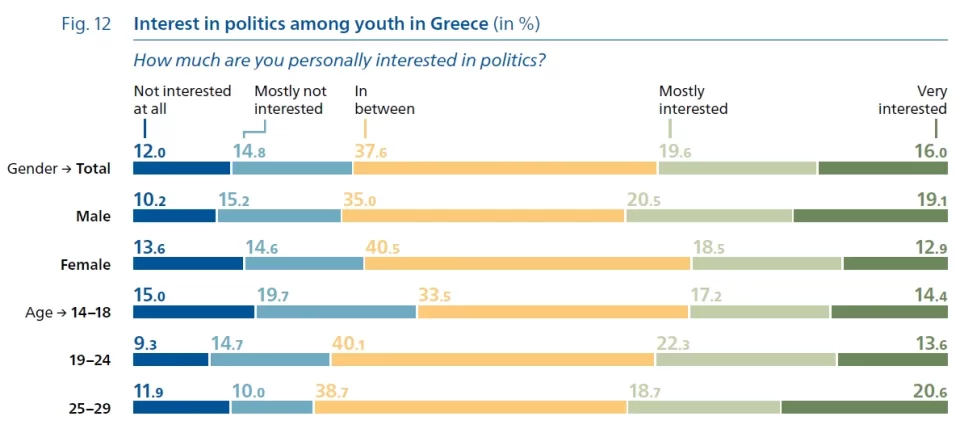
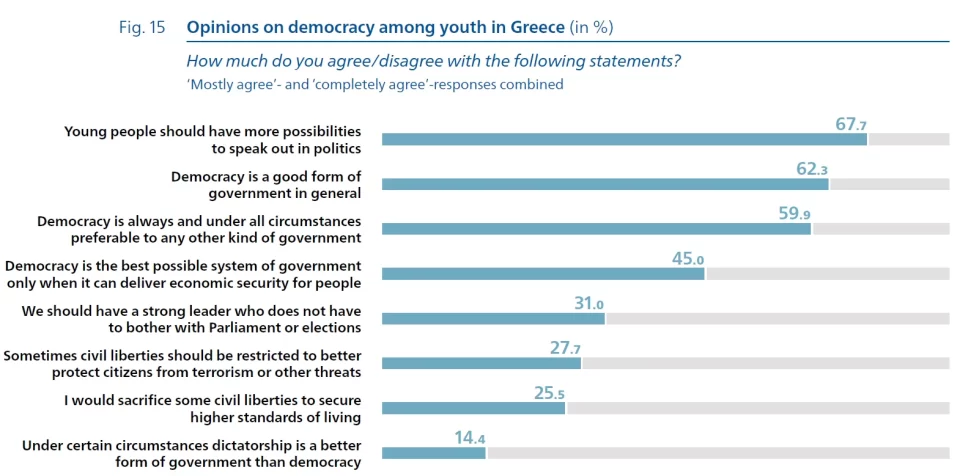
Source: Greece Youth Study 2024 (Friedrich Ebert Stiftung Foundation and EKKE)
While they support income equality, young Greeks are sceptical of state intervention in the economy. For instance, 78% agree that the Greek government should take more responsibility to ensure that everyone is provided for. But only 34.4% agree that government ownership of business and industry should be increased.
According to the survey authors, Greek youth follow a trend shown by empirical research. People tend to trust institutions that are not politicised and divisive, but tend to represent the community as a whole. This means that Greek youth exhibit a high percentage of trust in the army, courts, or the church. The EU and civil society organizations show similar levels of trust. The Greek parliament, trade unions, the Greek media, and Greek political parties find themselves at the bottom of the trustworthiness list.
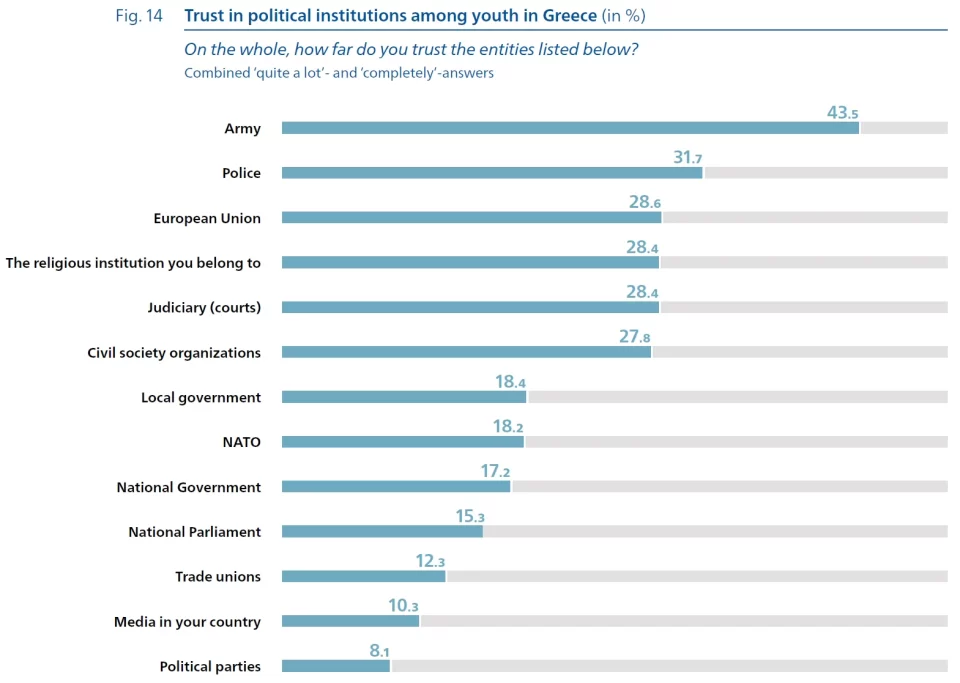
Source: Greece Youth Study 2024 (Friedrich Ebert Stiftung Foundation and EKKE)
Young Greeks identify as European citizens, and hold anti-immigration views as well as the belief that those living in Greece should adopt Greek customs and values. With regards to religion, most youths in Greece describe themselves as Greek Orthodox, but few practice religion.
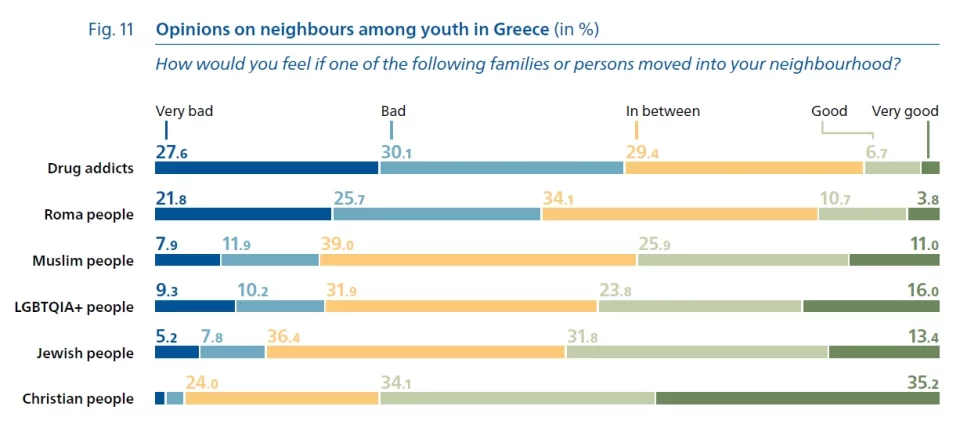
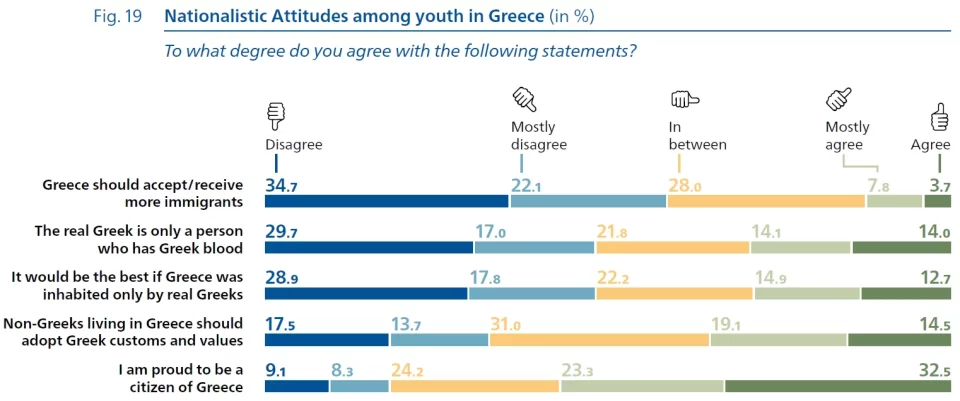
Source: Greece Youth Study 2024 (Friedrich Ebert Stiftung Foundation and EKKE)
Social media use has been linked to lower self-esteem and other mental health issues. But it plays a major role in daily life of Greek youth, especially among young women. 36.8% of women report ‘heavy’ social media use, compared to 26.5% of men. Online platforms have also become the primary source of news, education, and training for Greek youth. Traditional information channels are becoming less relevant mainly because of the low levels of trust in the Greek media landscape.
Finally, 56.5% of young Greeks express a desire to have at least one child in the future, usually in their thirties. 21.6% of them would prefer not to have children, while 21.9% remain undecided. Percentages of those wishing to have children tend to diminish after age 36, which indicates this age as an important milestone in Greece for family planning.
Download the Youth Study here.







